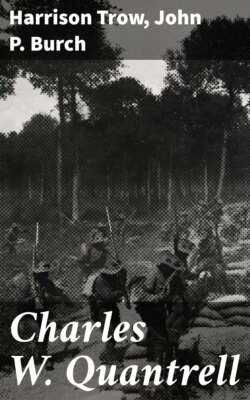Читать книгу Charles W. Quantrell - Harrison Trow - Страница 15
На сайте Литреса книга снята с продажи.
Jayhawkers and Militia Murder Old Man Blythe’s Son
ОглавлениеTable of Contents
Quantrell and His Company Were on Foot Again and Jackson County was filled with troops. At Kansas City there was a large garrison, with smaller ones at Independence, Pink Hill, Lone Jack, Stoney Point and Sibley. Peabody caused the report to be circulated that a majority of Quantrell’s men were wounded, and that if the brush were scoured thoroughly they might be picked up here and there and summarily disposed of. Raiding bands therefore began the hunt. Old men were imprisoned because they could give no information of a concealed enemy; young men murdered outright; women were insulted and abused. The uneasiness that had heretofore rested upon the county gave place now to a feeling of positive fear. The Jayhawkers on one side and the militia on the other made matters hot. All traveling was dangerous. People at night closed their eyes in dread lest the morrow should usher in a terrible awakening. One incident of the hunt is a bloody memory yet with many of the older settlers of Jackson County.
An aged man by the name of Blythe, believing his own house to be his own, fed all whom he pleased to feed, and sheltered all whom it pleased him to shelter. Among many of his warm personal friends was Cole Younger. The colonel commanding the fort at Independence sent a scout one day to find Younger, and to make the country people tell where he might be found. Old man Blythe was not at home, but his son was, a fearless lad of twelve years. He was taken to the barn and ordered to confess everything he knew of Quantrell, Younger, and their whereabouts. If he failed to speak truly he was to be killed. The boy, in no manner frightened, kept them some moments in conversation, waiting for an opportunity to escape. Seeing at last what he imagined to be a chance, he dashed away from his captors and entered the house under a perfect shower of balls. There, seizing a pistol and rushing through the back door towards some timber, a ball struck him in the spine just as he reached the garden fence and he fell back dying, but splendid in his boyish courage to the last. Turning over on his face as the Jayhawkers rushed up to finish him he shot one dead, mortally wounded another, and severely wounded the third. Before he could shoot a fourth time, seventeen bullets were put into his body.
It seemed as if God’s vengeance was especially exercised in the righting of this terrible wrong. An old negro man who had happened to be at Blythe’s house at the time, was a witness to the bloody deed, and, afraid of his own life, ran hurriedly into the brush. There he came unawares upon Younger, Quantrell, Haller, Todd, and eleven of his men. Noticing the great excitement under which the negro labored, they forced him to tell them the whole story. It was yet time for an ambuscade. On the road back to Independence was a pass between two embankments known as “The Blue Cut.” In width it was about fifty yards, and the height of each embankment was about thirty feet. Quantrell dismounted his men, stationed some at each end of the passageway and some at the top on either side. Not a shot was to be fired until the returning Federals had entered it, front and rear. From the Blue Cut this fatal spot was afterwards known as the Slaughter Pen. Of the thirty-eight Federals sent out after Cole Younger, and who, because they could not find him, had brutally murdered an innocent boy, seventeen were killed while five—not too badly shot to be able to ride—barely managed to escape into Independence, the avenging Guerrillas hard upon their heels.
